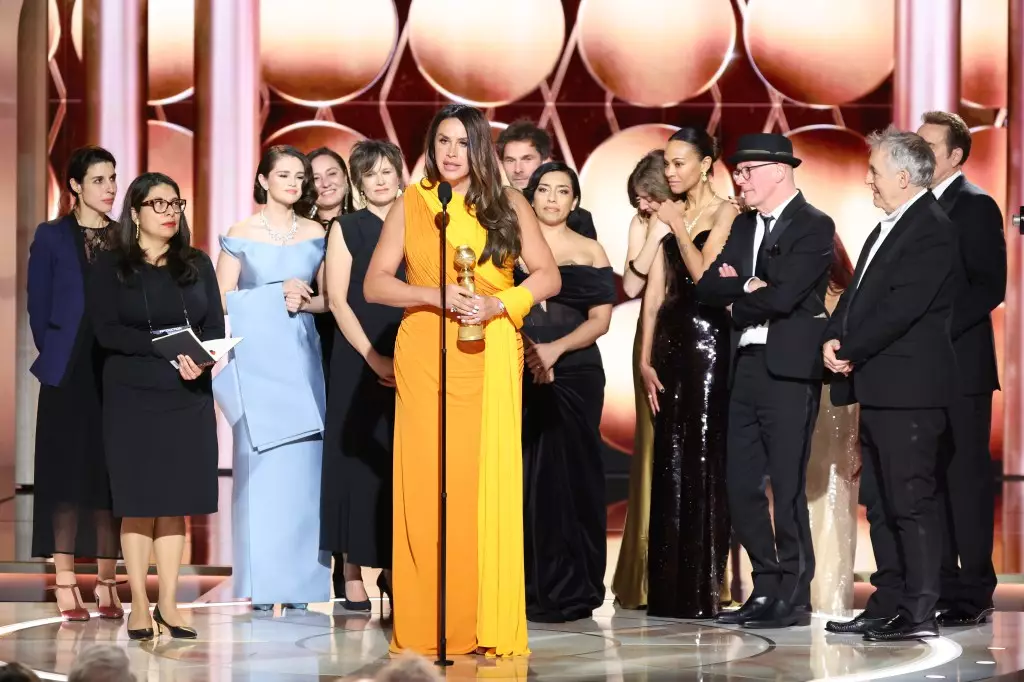As the 82nd Annual Golden Globe Awards aired, it faced formidable competition from popular Saturday Night Football offerings, yet managed to garner a substantial audience. The event attracted an average of 10.1 million viewers, according to overnight data from VideoAmp, provided by its producer, Dick Clark Productions, and broadcaster CBS. Although a direct year-over-year comparison is challenging due to the unavailability of similar ratings for the previous year, the figures signify a healthy influx of viewers in CBS’s inaugural hosting of the ceremony.
This year’s ceremony experienced a notable 9.4 million viewers according to Live+Same Day reports, an increment that hints at a potential recovery in audience engagement post-Golden Globes’ scandal-ridden past. While the ratings compiled by VideoAmp are slightly higher than Nielsen’s traditional metrics, the current figures reflect an upward trajectory compared to two years prior when the ceremony hit an all-time low of just 6.3 million viewers.
One pivotal factor contributing to the audience’s reception was the Globe’s return to the coveted Sunday night slot, which historically has bolstered viewing numbers. However, the logistical issues surrounding the Kansas City Chiefs vs. Denver Broncos game, which acted as a lead-in for the awards, complicated matters. Key players sat out, leading to a less compelling matchup that wasn’t as attractive for viewers compared to the previous year’s NFL contest. Nonetheless, a certain level of viewer crossover must have occurred, providing the Globes with a paramount ratings boost.
Simultaneously, the event was in competition with NBC’s Sunday Night Football showdown, drawing a hefty 28.5 million viewers—signifying its stature as the biggest regular-season finale in a decade. This fierce competition undoubtedly put pressure on the Globes to not only hold attention but to claim a respectable viewership amidst an entertainment-packed evening.
In a significant move emblematic of the current media landscape, CBS reported that viewership for the Globes on streaming platforms like Paramount+ and the CBS App rose by 9% year-on-year. As traditional TV models gradually give way to streaming services, such figures reflect a changing dynamic in how awards show content is consumed. Enhanced engagement through digital channels is a crucial consideration as promotions pivot more towards streamlined online offerings and less on purely linear viewership.
The Golden Globes didn’t just succeed in traditional metrics; it also dominated social media landscapes. Garnering 40 million social interactions—the highest ever recorded in the show’s history—demonstrates the growing importance of digital discourse surrounding televised events. The show generated over 45 billion potential impressions, marking a significant increase from previous years. In today’s context, where social media plays a central role in shaping audience perceptions and engagement, such statistics underscore the necessity for any televised event to resonate beyond mere viewership numbers.
The recent awards ceremony also revealed shifting tides within the organizational structure of the Golden Globes. Following a tumultuous period surrounding their past governance, the current event marks significant milestones, including the first awards distributed under a new governing body established post-HFPA’s dissolution in 2023. This change has opened the door for new winners, such as Fernanda Torres and Demi Moore, who snagged highly coveted awards for their performances. Movies like Netflix’s *Emilia Pérez* and A24’s *The Brutalist* were also noted for their nominations and triumphs, suggesting a broader diversity in voices and stories being acknowledged this year.
The 82nd Annual Golden Globe Awards signify a resilient comeback in a post-pandemic society grappling with larger cultural considerations. Despite facing significant competition, a switch to streaming, and evolving governance, the ceremony has echoed a revitalized spirit. The figures indicate a recovery not just in viewership but in audience engagement, driven by greater social media interaction and a commitment to representation in storytelling. Moving forward, the Golden Globes will need to maintain this momentum as it navigates the future of entertainment in an increasingly fractious media landscape.
